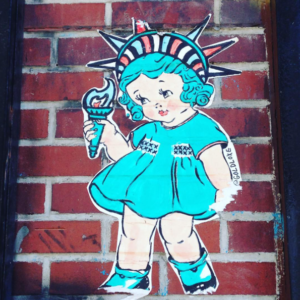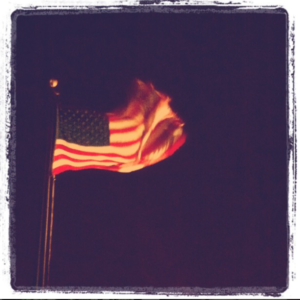 Again, I am reading E.B. White. Having finished my umpteenth re-reading of One Man’s Meat, I’ve moved on to The Points of My Compass. Like One Man’s Meat, it feels like an old friend.
Again, I am reading E.B. White. Having finished my umpteenth re-reading of One Man’s Meat, I’ve moved on to The Points of My Compass. Like One Man’s Meat, it feels like an old friend.
As with much of my non-fiction reading, it reminds me that my problems are not unique and my society’s struggles are not new. (I’m reminded especially of my reading of Langston Hughes’ writings a while back, and how sadly familiar were many of his themes). I’m both comforted and dismayed by the reminder.
In “Bedfellows,” White swings between musings about his long-dead dachshund Fred and commentary on the politics of his time. Writing in 1956, White was concerned by loyalty investigations and attempts to force conformity in a nation that was born as a refuge for people who didn’t conform. President Eisenhower had recently given a speech declaring the importance of prayer in a democracy—at least in his democracy—and White bristled.
“Democracy, if I understand it at all, is a society in which the unbeliever feels undisturbed and at home. … The repeated suggestion by the present administration that religious faith is a precondition of the American way of life is disturbing to me and, I am willing to bet, to a good many other citizens. … My wife, a spiritual but not a prayerful woman, read Mr. Eisenhower’s call to prayer in the Tribune and said something I shall never forget: ‘ Maybe it’s all right,’ she said. ‘But for the first time in my life I’m beginning to feel like an outsider in my own land.’ “
This hits home because this is where I have found myself since our most recent presidential election.
 Like many who call themselves liberal, I woke up on the morning after the 2016 election wondering how my country could have made the decision it did. How could my fellow citizens—especially those who consider themselves people of faith—have elected a candidate who built a campaign on hatred and fear-mongering? How could we have elected a man who seemed to happily incite violence against those who disagreed with him; demonized immigrants and Muslims; bragged of assaulting women; ridiculed the down-trodden and disabled? The list goes on.
Like many who call themselves liberal, I woke up on the morning after the 2016 election wondering how my country could have made the decision it did. How could my fellow citizens—especially those who consider themselves people of faith—have elected a candidate who built a campaign on hatred and fear-mongering? How could we have elected a man who seemed to happily incite violence against those who disagreed with him; demonized immigrants and Muslims; bragged of assaulting women; ridiculed the down-trodden and disabled? The list goes on.
Let me be clear: This is not about losing and spilled milk and positions on the issues of the day. I’m used to backing losing candidates and being disappointed after an election. This is about personal character and decency and kindness. Or lack thereof. My dilemma was not that my candidate lost, or that my political opinions didn’t prevail; it was that my nation was willing to overlook the personal ugliness that defined the other candidate’s campaign.
Like Katherine Angell White, I woke up feeling for the first time in my life that perhaps I didn’t belong here. My America is a welcoming America, an America that embraces immigrants and invites them to help us build a greater nation, an America that supports and uplifts the down-trodden, that opens its arms to all who need refuge. My America is one that defends individual liberties, and protects freedom of expression and freedom of the press. The Bill of Rights is important in my America.
I don’t want to lose that America.
So as I read “Bedfellows,” I am comforted somewhat by the historic parallels, and by the reminder that the reactionary and intolerant fervor of the McCarthy era was relatively short-lived.
 I hear many echoes of White’s time in our current politics, not least in the current administration’s attacks on the Bill of Rights. Those who would enforce a specific religion on others have become emboldened, and attacks on the press—literally a physical attack in one recent instance during Montana’s election campaign, but more frequently verbal attacks and denials of access and more verbal attacks—hearken back to McCarthy-era hearings targeting journalists.
I hear many echoes of White’s time in our current politics, not least in the current administration’s attacks on the Bill of Rights. Those who would enforce a specific religion on others have become emboldened, and attacks on the press—literally a physical attack in one recent instance during Montana’s election campaign, but more frequently verbal attacks and denials of access and more verbal attacks—hearken back to McCarthy-era hearings targeting journalists.
We’re not out of the woods.
In 1962, when he was preparing The Points of My Compass for publication, White updated several of the essays with postscripts, including “Bedfellows.” In that update, he noted that the U.S. Supreme Court had recently upheld separation of church and state in a New York school prayer case. He lauded the court’s decision:
“I think the court again heard clearly the simple theme that ennobles our Constitution: that no one shall be made to feel uncomfortable or unsafe because of nonconformity. New York State, with the best intentions in the world, created a moment of gentle orthodoxy in public school life, and here and there a child was left out in the cold, bearing the stigma of being different. It is this one child that our Constitution is concerned about—his tranquility, his health, his safety, his conscience. What a kindly old document it is, and how brightly it shines, through interpretation after interpretation!”
That is the kindness that is at the core of my America. That is the Constitution that I hope will be strong enough to continue to shine.
